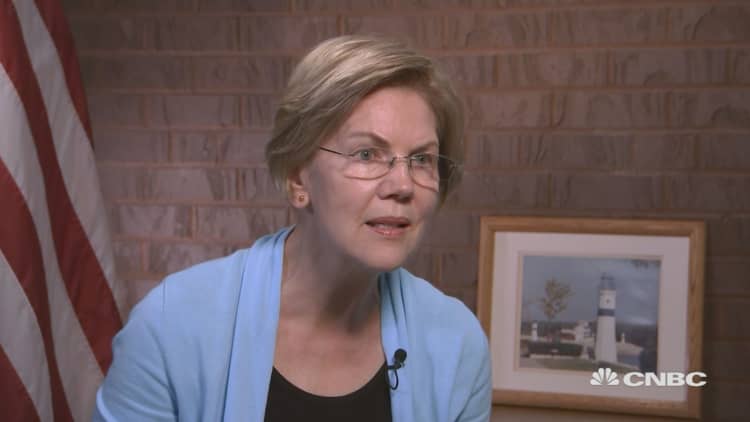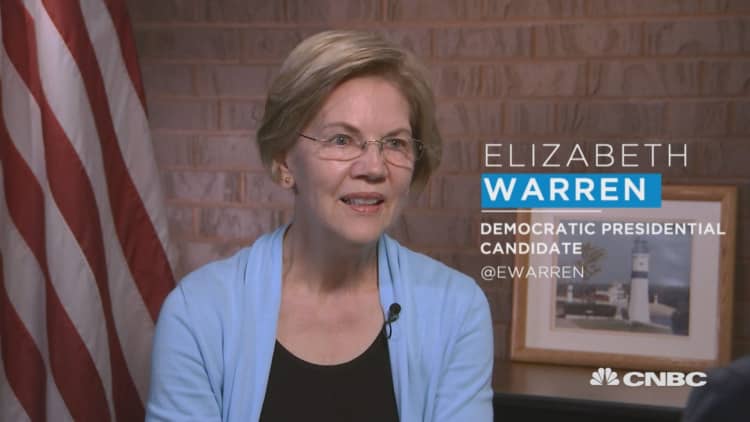Presidential hopeful Sen. Elizabeth Warren sent a letter to Federal Reserve and the Federal Deposit Insurance Corporation, questioning regulators' approval of the largest bank deal since the financial crisis.
The letter, dated Dec. 12 and obtained by CNBC, asks regulators to defend their approval of the $28 billion merger of regional banks BB&T and SunTrust. The deal, which closed Dec. 6. has been a lightning rod for Democrats who believe its approval symbolizes a weakening in U.S. regulation of financial institutions under President Donald Trump.
The merger created Truist Financial, the country's sixth-largest bank with $450 billion in assets. Truist agreed to selling off roughly $2.3 billion in deposits in seven markets to secure deal approval.

"Countrywide was a $200 billion institution when it failed. Washington Mutual was $307 billion. Their failure presented material risks to the financial system. Why does the Fed believe that the failure of a $450 billion institution would not present risks to the financial system?" asked Warren and the letter's co-author, Rep. Jesus García, D-Ill. The two asked the same question of the FDIC.
The letter came weeks after Warren and Garcia introduced their Bank Merger Review Modernization Act to tighten oversight of America's bank deal approval process. The two have argued that, if the act had been passed prior to the Truist deal, it would have been blocked.
Though unlikely to get past a Republican-controlled Senate, the proposal puts a spotlight on the review process for banks, which Warren and Garcia decry as "fundamentally broken."
Today, all bank deals must be approved by the Fed, the FDIC and the Office of the Comptroller of the Currency. Warren and Garcia believe the agencies often review the deals with banks in secret, prior to their being announced. They also say the agencies focus too much on their impact on the industry rather than also looking at the consumer.
Of the 3,819 bank merger applications the Fed has received between 2006 and 2017, 3,316 have been approved, and the rest were withdrawn. None has been rejected.
As remedy, Warren and Garcia want the Consumer Financial Protection Bureau to have a say in the approval process. The CFPB is the brainchild of Warren, created after the financial crisis to protect consumers from financial institutions. Warren and Garcia want regulators to focus more on the effects of a merger on a community, like market concentration of individual banking products and credit that matches community needs.
Warren and Garcia highlight these elements in their letter. They ask regulators whether they looked beyond Truist's impact on the share of total deposits, to other products like lending for small businesses or home mortgages. They inquire whether SunTrust's "satisfactory" record of meeting community credit needs was a cause for concern, when BB&T's record was "outstanding."
They raised other questions about SunTrust's track record.
"On the same day the merger was approved, the Federal Reserve issued a consent order against SunTrust as a result of misleading or inaccurate statements to business customers about the operation and billing of certain add-on products," they wrote. "Are any executives who were in the chain of command responsible these violations in a leadership position of the new Truist Bank?"
Financial reform has been a key focus for Warren as both a senator and presidential candidate. She was an advocate of the 2010 Dodd-Frank Act that tightened bank oversight. As president, Warren has said she would enact a 21st century Glass-Steagall Act that would resurrect a wall between commercial and investment banks.
Critics say her proposals do not reflect the reform the country has embraced since the recession. Some say Dodd-Frank's burdens were too onerous, forcing small banks to get larger in order to have the resources to manage the compliance they require. Smaller banks are also competing with giants like Citigroup, Bank of America, Wells Fargo and J.P. Morgan Chase that have the funds to invest in rapidly evolving technology. J.P. Morgan has said it is expanding its branch network to cover 93% of the U.S. population by the end of 2022.

Regional banks that want to merge have found it easier to do so under Trump, a staunch opponent of Dodd-Frank. The Fed in 2017 quadrupled the deal threshold that would trigger an extensive regulatory review to $100 billion from $25 billion.
A year later, Congress and Trump approved a bill led by Sen. Mike Crapo, R-Idaho, that raised the minimum threshold that deemed bank holding companies "systemically important" — or too big to fail — to $250 billion from $50 billion. The goal was to help reduce regulatory burden and costs for banks on the lower end of the spectrum.
While Dodd-Frank co-sponsor Barney Frank has said the $50 billion floor was too low, he warned at the time a $250 billion cutoff would put "us in Lehman Brothers territory."


